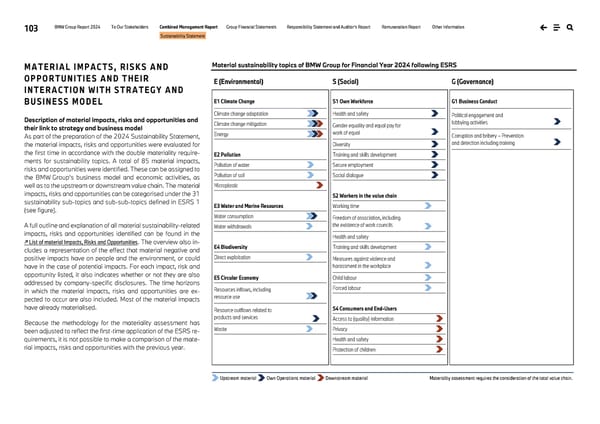103 BMW Group Report 2024 To Our Stakeholders Combined Management Report Group Financial Statements Responsibility Statement and Auditor’s Report Remuneration Report Other Information Sustainability Statement MATERIAL IMPACTS, RISKS AND OPPORTUNITIES AND THEIR INTERACTION WITH STRATEGY AND BUSINESS MODEL Description of material impacts, risks and opportunities and their link to strategy and business model As part of the preparation of the 2024 Sustainability Statement, the material impacts, risks and opportunities were evaluated for the first time in accordance with the double materiality require- ments for sustainability topics. A total of 85 material impacts, risks and opportunities were identified. These can be assigned to the BMW Group’s business model and economic activities, as well as to the upstream or downstream value chain. The material impacts, risks and opportunities can be categorised under the 31 sustainability sub-topics and sub-sub-topics defined in ESRS 1 (see figure). A full outline and explanation of all material sustainability-related impacts, risks and opportunities identified can be found in the ↗ List of material Impacts, Risks and Opportunities. The overview also in- cludes a representation of the effect that material negative and positive impacts have on people and the environment, or could have in the case of potential impacts. For each impact, risk and opportunity listed, it also indicates whether or not they are also addressed by company-specific disclosures. The time horizons in which the material impacts, risks and opportunities are ex- pected to occur are also included. Most of the material impacts have already materialised. Because the methodology for the materiality assessment has been adjusted to reflect the first-time application of the ESRS re- quirements, it is not possible to make a comparison of the mate- rial impacts, risks and opportunities with the previous year. Material sustainability topics of BMW Group for Financial Year 2024 following ESRS E (Environmental) S (Social) G (Governance) E1 Climate Change S1 Own Workforce G1 Business Conduct Climate change adaptation Health and safety Political engagement and lobbying activities Climate change mitigation Gender equality and equal pay for work of equal Energy Corruption and bribery – Prevention and detection including training Diversity E2 Pollution Training and skills development Pollution of water Secure employment Pollution of soil Social dialogue Microplastic S2 Workers in the value chain E3 Water and Marine Resources Working time Water consumption Freedom of association, including the existence of work councils Water withdrawals Health and safety E4 Biodiversity Training and skills development Direct exploitation Measures against violence and harassment in the workplace E5 Circular Economy Child labour Resources inflows, including resource use Forced labour Resource outflows related to products and services S4 Consumers and End-Users Access to (quality) information Waste Privacy Health and safety Protection of children Upstream material Own Operations material Downstream material Materiality assessment requires the consideration of the total value chain.
 BMW Group Report 2024 Page 102 Page 104
BMW Group Report 2024 Page 102 Page 104